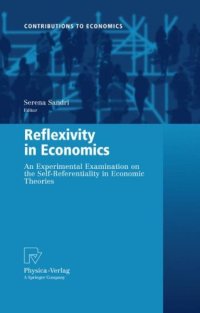
Ebook: Reflexivity in Economics: An Experimental Examination on the Self-Referentiality of Economic Theories
Author: Dr. Serena Sandri (auth.)
- Tags: Economic Theory, Methodology and the History of Economic Thought, Philosophy of Science, Philosophy of the Social Sciences
- Series: Contributions to Economics
- Year: 2009
- Publisher: Physica-Verlag Heidelberg
- Edition: 1
- Language: English
- pdf
This study discusses the implications of the recursive or self-reflexive effects of economic theories on bounded rational behaviour and interaction. It focuses on the mechanisms through which bounded rational actors perceive the self-referential nature of economic theories and might absorb their prescriptions. As individuals think and are conscious of their thought, reflexivity is potentially involved in all human acts of cognition and in all conceptualizations. Further, the individuals can make use of social theories which can therefore yield recursive effects and interfere with the phenomena they aim to depict. Taking into consideration the bounded rationality of the individuals, this study investigates the modalities by means of which the recursive character of economic theorizing is perceived and the conditions under which economic theories affect behaviour, according to the results of two economic experiments focussing the absorbability of guessing-games' and informational cascades' theories.
This study discusses the implications of the recursive or self-reflexive effects of economic theories on bounded rational behaviour and interaction. It focuses on the mechanisms through which bounded rational actors perceive the self-referential nature of economic theories and might absorb their prescriptions. As individuals think and are conscious of their thought, reflexivity is potentially involved in all human acts of cognition and in all conceptualizations. Further, the individuals can make use of social theories which can therefore yield recursive effects and interfere with the phenomena they aim to depict. Taking into consideration the bounded rationality of the individuals, this study investigates the modalities by means of which the recursive character of economic theorizing is perceived and the conditions under which economic theories affect behaviour, according to the results of two economic experiments focussing the absorbability of guessing-games' and informational cascades' theories.